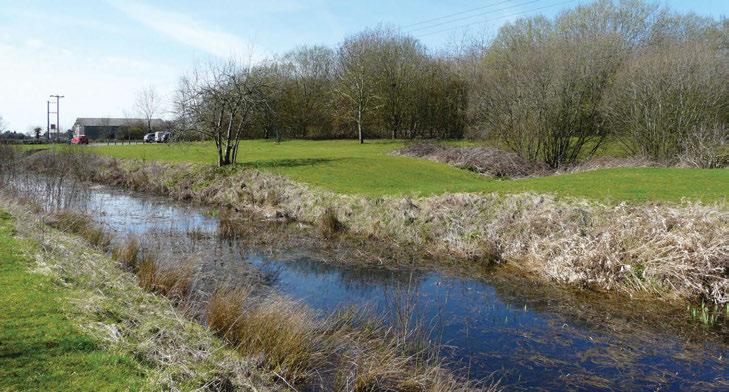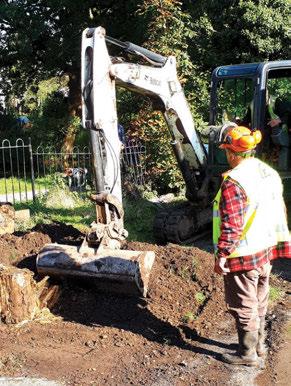
7 minute read
Restoration Hub
Waterways in Progress grant projects
IWA’s 2019 Waterways in Progress report sought to demonstrate how well-thoughtout, partial restoration initiatives can start to deliver benefits right from day one. We followed this up in May 2019 by launching a new grant offering waterway organisations up to £100,000 to assist in funding a project or projects which promote the Waterways in Progress vision and values. The grant has been made possible by legacies that have been left to the Association.
Two big objectives of the report were to encourage local authorities at every level across the country to consider having at least one named member of staff responsible for the promotion and development of navigable and derelict waterways within their constituency, and to promote the idea of restoration works for today. The scale of many restorations – especially in terms of the funding needed and construction skills required – could stop progress in its tracks. However, if restoration groups can focus on smaller-scale projects that start bringing about positive changes from day one, benefits including local awareness and community support lead to the larger issues feeling more surmountable.
A key requirement for any organisation applying for the grant was that their project would start to deliver right from day one – and while the project did not have to necessarily deliver more miles of waterways it had to focus on wider benefits, such as creating partnerships, engaging communities and inspiring key stakeholders, as well as delivering on at least one of the key Waterways in Progress themes: • Channelling Regeneration – projects which bring economic benefits to the local area • Promoting Personal Development & Well-being – encouraging people to get out and about for both physical and mental health benefits as well as volunteering and learning new skills • Creating Community Spaces – projects which build social cohesion and instil civic pride • Enhancing Heritage & Habitats – the delivery of environmental benefits and/or the preservation of history and tradition for the benefit of future generations.
The Waterways in Progress Grant was launched at IWA’s Parliamentary Reception in 2019 and received 28 expressions of interest from 27 different waterways groups. Seven projects were invited to progress to stage two of the process and asked to submit more detailed applications for assessment. Four projects were successful. The Ashby Canal Association application was announced in the Spring 2020 issue of Waterways magazine.
CHESTERFIELD CANAL TRUST
Rewatering Renishaw Phase 1a Grant allocated: £50,000
In 2010, approximately 500m of the Chesterfield Canal channel was restored through Renishaw, Derbyshire, as part of a housing development. However, due to various issues, the stretch proved to be unuseable and delivered little benefit to the newly created community on the housing estate and wider Renishaw community.
Now the Rewatering Renishaw project seeks to transform and extend the derelict channel into a permanent waterspace that local people can celebrate and enjoy. The project is part of Phase 1 of the Chesterfield Canal Trust’s ambition to restore the canal to full navigation by 2027, the 250th anniversary of the canal’s original opening. The complete Phase 1 works will extend the current limit of navigation from the town of Staveley to the village of Renishaw, and include the construction of three new accommodation bridges, four new bridleway bridges, a lock, a railway overbridge, an aqueduct and approximately 5km of new or restored channel.
The entire Phase 1 of the project will take several years to complete and require over £4m to be raised. The works at Renishaw (Phase 1a) can be completed much earlier and provide lasting benefits to the community long before either the Phase 1 works are completed, or it forms part of a fully restored waterway. This lasting and standalone benefit from an interim restoration stage is a prime example of the Waterways in Progress philosophy.
The grant, with additional funding from Chesterfield Canal Trust and Derbyshire County Council, will allow the trust to undertake the following Phase 1a work:
• 550m of canal channel re-profiled to navigable standards
• 1,050m of canal channel relined using a geosynthetic clay liner
• 250m of stone gabions installed in the canal banks and waterproofed by casting a concrete face up to the water level
• Clinker Wood side weir restored and a temporary pumping system provided to supply water from the River Rother to the canal
• 550m of towpath resurfaced, making it suitable for pedestrians and cyclists. The current path is virtually impassable despite being the official public right of way.

Currently, the restored channel of the Chesterfield Canal through Renishaw does not benefit the local community.
• A further 915m of towpath resurfaced to provide a circular 2.5km surfaced route incorporating the Trans-Pennine Trail
• Eight picnic benches, made שׁ om recycled plastic, installed across two locations along with three standard benches in other areas of the scheme. Two of the picnic benches will be suitable for wheelchair users
• Installation of signage to encourage users of the Trans-
Pennine Trail to explore the canal and the village, plus the provision of 12 cycle stands to allow cyclists to secure their bikes.
Alongside the above works, the project partners plan to deliver the following additional works to futureproof the canal for navigation: • 210m of concrete and masonry wash walling constructed around
Black’s Pit corner, in order to protect the banks around this tight turn • 285m of steel piling installed to the south of Barlborough Road Bridge, to provide future visitor moorings.
Early delivery of the Phase 1a works will also help to rebuild the support in Renishaw for the project and build credibili for the abili of the project partners to deliver the scheme. It will unlock the acquisition of further sections of canal om landowners who are supportive and prepared to sell the relevant land, but currently will not do so for fear of being le with a legacy similar to the ‘restored’ channel in Renishaw.
The key beneficiaries of the project will be the local community of Renishaw, who will be able to use the pleasant waterspace environment secure in the knowledge that it is not dependent on the future canal connection. The improved towpaths and 2.5km circular route will benefi t the health and well-being of the local communi and a ract new visitors to this fl at, waterside walk. Data shows that in 2018, over 52,000 walkers and cyclists were recorded using the Trans-Pennine Trail at Renishaw, but most bypassed the village without even realising it was there. Cycle stands and picnic benches will encourage people to stop while exploring the route and take a short, pleasant detour into the village.
SWANSEA CANAL SOCIETY
Coed Gwilym Park Slipway Grant allocated: £18,000
The Swansea Canal Socie ’s Coed Gwilym Park Slipway Project aims to encourage boating on the canal and a ract visitors to the local area, while ensuring the waterway continues to be valued as a green corridor through the post-industrial landscape of Swansea.
Work is currently underway to dredge approximately 1 mile of the canal to navigable depth and further work is planned to restore locks and a pound to extend the navigable section of the Swansea Canal by 2½ miles. The Waterways in Progress grant will fund the creation of a brandnew slipway giving access to this stretch of canal to trailable boats and other small craft.
While integral to the long-term aims of restoring the canal, the project is also being undertaken with a view to hosting an IWA Trailboat Festival in 2023 to further raise the profi le of the socie ’s work in the canal’s 225th anniversary year. The slipway will also permit the regular launch of the socie ’s workboat and new trip-boat. The passenger cra will be used to generate income for the socie , running alongside its current canoehire operation, and help establish the canal as a destination. The more activi on the water, the more a ractive it will be to visitors.

Preparing the groundwork for the Coed Gwilym Park Slipway Project.
Another key outcome of the project is the upskilling of local volunteers giving them the opportunities to learn about formwork, concentrating and bricklaying during the construction process.
WILTS & BERKS CANAL TRUST
Shrivenham Canal Park, Grant allocated: £13,960
The Shrivenham Canal Park project aims to establish a small 4-acre park, owned by the Wilts & Berks Canal Trust, as a communi and environmental asset.
The Waterways in Progress grant will help fund activities designed to increase the biodiversi , aesthetics and wildlife of the area, including the refi lling of the 125m section of canal that forms part of the park. The grant application also includes the purchase of a solar pump which will take water om a stream to the east of the park and pump it to the canal section alongside the park.
A key aspect of this project is communi engagement. The trust hopes to work with local communi groups to establish ‘green teams’ to help support the ongoing maintenance of the park. It also hopes the waterway park will be used by kayakers and as a safe space by the communi for rest and recreation on the route of the Shrivenham Circular Walk. Usage of this kind will demonstrate the value of the canal to local people and adjacent landowners.









